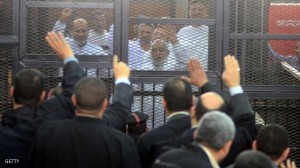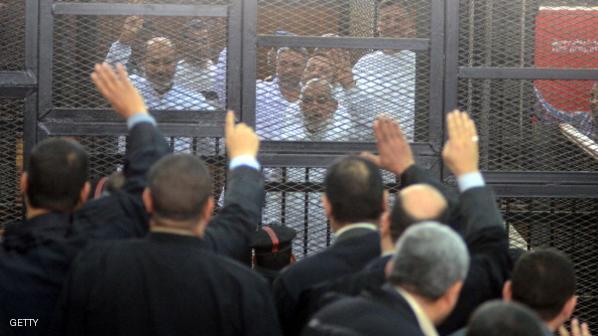
The undersigned organizations are extremely concerned about the Minya Felony Court’s decision yesterday, Monday, March 4, to refer the cases of 529 defendants sentenced to death to the state grand mufti for his opinion. The defendants were sentenced in connection with the violence in Matay, Minya, following the dispersal of the two sit-ins held by supporters of former President Mohamed Morsi in Rabaa al-Adawiya and al-Nahda Squares. The decision, and the court’s readiness to sentence such a large number of people to death in abbreviated trials, constitutes a dangerous, unprecedented shift in the Egyptian judiciary’s treatment of such cases and represents a grave violation of both the right to a fair trial and the right to life.
The court issued this decision less than a week after the start of the trial of the defendants, who were charged in connection with violence that led to the death of Col. Mustafa Ragab, the deputy chief of the Matay police station, the attempted murder of other police officers, the theft of weapons from the police station, the destruction of public and private property, and the torching of several private cars.
The ruling was issued following only two sessions of the trial and in the absence of the defendants and their lawyers. The first session lasted only 30 minutes, as counsel for the defendants moved for the recusal of the judges hearing the case. Witnesses were not called, evidence was not presented in court, and the accused were unable to defend themselves.
The undersigned organizations note that group trials such as the case of the 529 defendants represent a grave violation of the right to a fair trial and of other principles, most prominently the principle of individualized punishment, which is enshrined in the Egyptian constitution, including in the most recent constitutional amendments approved through a public referendum, as well as international rights conventions ratified by Egypt.
The undersigned organizations are especially concerned by this expansive use of the death penalty in light of the increasingly repressive measures taken against political dissidents of various affiliations and the proposed counterterrorism legislation that grows more authoritarian by the day. The government recently approved two counterterrorism draft laws with several dangerous provisions that lack proper legal safeguards. The draft laws make it possible to impose the death penalty for an extensive list of actions and grant broad powers to security personnel and the Public Prosecution in matters of investigation and interrogation.
We ask that all defendants be granted guarantees for a fair trial, including, first and foremost, the right to defense and to an attorney and the right to be charged with a specific offense backed by evidence, as well as adequate time to prepare a defense and response.
SIGNATORY ORGANIZATIONS:
- Cairo Institute for Human Rights Studies
- Egyptian Initiative for Personal Rights
- Hesham Mubarak Law Center
- Egyptian Association for Community Participation Enhancement
- Center for Egyptian Women’s Legal Assistance
- Egyptian Center for Economic and Social Rights
- Arab Penal Reform Organization
- New Woman Foundation
- Andalus Institute for Tolerance and Anti-Violence Studies
- Nazra for Feminist Studies
- Arab Network for Human Rights Information
- Association for Freedom of Thought and Expression
- Egyptians Against Religious Discrimination
- Egyptian foundation for Advancement of the Childhood Conditions
- Land Center for Human Rights
- The Human Rights Association for the Assistance of the Prisoners
- Appropriate Communications Techniques for Development (ACT)
Share this Post

